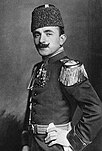This article includes a list of general references, but it lacks sufficient corresponding inline citations. (June 2011) |
The Three Pashas,[1] also known as the Young Turk triumvirate[2][3] or CUP triumvirate,[4] consisted of Mehmed Talaat Pasha,[a] the Grand Vizier (prime minister) and Minister of the Interior; Ismail Enver Pasha, the Minister of War and Commander-in-Chief to the Sultan; and Ahmed Djemal Pasha, the Minister of the Navy and governor-general of Syria, who effectively ruled the Ottoman Empire after the 1913 Ottoman coup d'état and the subsequent assassination of Mahmud Shevket Pasha.
The Three Pashas, all members of the Central Committee of the Committee of Union and Progress, were largely responsible for the Empire's entry into World War I in 1914 on the side of the Central Powers and also largely responsible for the genocide of some one million Armenians. The Turkish public has widely criticised the Three Pashas for drawing the Ottoman Empire into World War I and its subsequent defeat.[6] All three met violent deaths after the war—Talaat and Cemal were assassinated by the Armenian Revolutionary Federation as part of Operation Nemesis, whilst Enver died leading the Basmachi Revolt near Dushanbe, present-day Tajikistan.
After their deaths, Talaat and Enver's remains have been reburied at the Monument of Liberty in Istanbul[7][8] and many of Turkey's streets have been controversially renamed in their honour.[9]
- ^ Ottoman Turkish: اوچ پاشلار, Turkish: Üç Paşalar
- ^ Kieser 2018, p. xii.
- ^ Yacoubian, George S. Jr (2020–2021). "Toward Permanent Peace and Stability in Artsakh". Human Rights Brief. 24: 147.
- ^ Tanvir Wasti, Syed (2020). "A review of the Turco-Italian war of 1911–1912 and related letters of Enver Pasha". Middle Eastern Studies. 56 (1): 131–141. doi:10.1080/00263206.2019.1627336. S2CID 198716187.
- ^ Kieser 2018, p. 2.
- ^ Cite error: The named reference
RubinKirişci2001was invoked but never defined (see the help page). - ^ Garibian, Sévane (2018). ""Commanded by my Mother's Corpse": Talaat Pasha, or the Revenge Assassination of a Condemned Man". Journal of Genocide Research. 20 (2): 220–235. doi:10.1080/14623528.2018.1459160. S2CID 81928705.
- ^ Uslanmam-History of the Republic Archived 13 January 2019 at the Wayback Machine (in Turkish)
- ^ Minute, Turkish (28 April 2021). "Hero, founder, or criminal? Talaat is still alive and well in Turkey". Turkish Minute. Retrieved 4 June 2023.
Cite error: There are <ref group=lower-alpha> tags or {{efn}} templates on this page, but the references will not show without a {{reflist|group=lower-alpha}} template or {{notelist}} template (see the help page).


